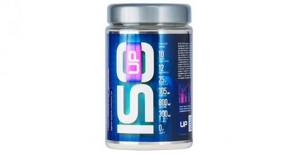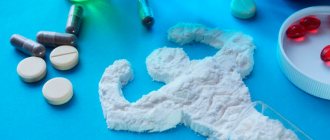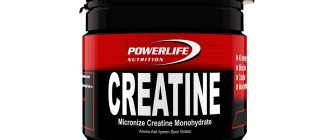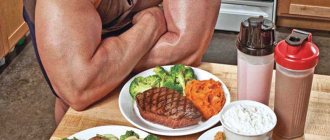Functions of isotonic
Isotonic drinks support the body with minerals and carbohydrates.
They do not contain absolutely all the substances an athlete needs, but they have a positive effect on energy potential and muscle function. Any solution contains glucose - the main and most valuable source of energy for maintaining metabolism. All cells in the body can obtain energy from glucose. During the process of glycolysis, carbohydrates are converted into ATP - adenosine triphosphoric acid, necessary for muscle function.
Simple sugars (dextrin, maltodextrin) replenish glycogen used up during exercise. As a result, the athlete gets the opportunity to train more intensely and cope better with loads.
Some isotonic drinks supply vitamins, which improves athletic performance, because vitamins serve as catalysts and inhibitors of metabolic processes.
The following can be added to the solution as auxiliary ingredients:
- Caffeine – to increase tone and activity.
- Creatine, glutamine - to increase muscle strength.
- Carnitine – to intensify fat burning.
It will not be difficult to choose an option that meets the type of training and individual needs.
Possible harms of taking isotonics
Taking an isotonic drink should be determined by the body’s physiological need for it. In cases where this drink is consumed by a person whose water and electrolyte balance is within normal limits, undesirable consequences may occur.
Salts retain water in the body, and its excess can cause tissue swelling. This can be dangerous for people prone to hypertension and is not advisable for those trying to lose weight. If excess salts are systematically introduced into the body, they can begin to be deposited, having a detrimental effect on the human musculoskeletal system.
In addition, an increased intake of salts into the body can lead to digestive disorders and even cramps.
Those who exercise to lose weight should not take isotonic drinks. Replenishing glycogen stores with the fast sugars found in these foods reduces results and slows down progress.
Compound
The main components are drinking water, electrolytes, carbohydrates, represented by 5-8 types of simple sugars (fructose, glucose, dextrin, etc.). This is enough to restore energy resources and salt levels.
- Electrolytes. In addition to salt (sodium chloride), magnesium and calcium are added to the formula. Their task is to maintain blood osmotic pressure (osp).
- Amino acids, tricarboxylic acids. Compounds that regulate biochemical processes. Their functionality is wide - from stimulating fat burning and maintaining mental activity to activating metabolism and improving anabolism.
- Micro- and macroelements (sports minerals).
Any isotonic drink copies biological parameters in composition and concentration of the main components. Minerals and carbohydrates, represented by fructose and glucose, are mixed in the liquid in a proportion similar to that in the blood. Therefore, isotonic drinks are easily absorbed, restore electrolyte balance, replenish fluid consumed through sweating, and at the same time provide carbohydrate support.
What are isotonics
Sports drinks are hypotonic, hypertonic and isotonic. Hypotonics promote rapid replenishment of fluid in the body during/after exercise, while hypertensives promote energy recovery after exercise.
“Isotonic” or “isosmotic” fluid is the medical definition of fluids with the same osmotic pressure as blood plasma. They do not change the osmotic pressure of the blood or the concentration of electrolytes in it. Therefore, drinks that help speed up the body’s recovery after physical activity are called isotonics. They are quite high in calories due to the presence of carbohydrates (maltose/glucose) and allow you to restore water balance and electrolyte content in the blood plasma.
Release forms
The sports nutrition market includes:
- Ready drinks.
- Powder mixtures.
If you wish, it is easy to make isotonic water with your own hands at home.
The simplest recipe
- 20 g honey.
- 30 ml of fruit juice (it’s better to take orange juice).
- A little salt.
- 500 ml water.
Dissolve honey in warm water, add remaining ingredients. This drink stimulates blood circulation well.
Tonic isotonic
- Black tea.
- 0.5 liters of water.
- 20 tablets of ascorbic acid 50 mg each.
Caffeine gives isotonic the properties of an energy drink, and vitamin C provides antioxidant protection.
You can prepare your own isotonic water especially for runners by replacing regular water with mineral water and adding 1 p. rehydron, BCAA, glucose, eleutherococcus or ginseng (20 drops).
Stimulating drink
- A little ginger.
- 1000 ml water.
- 3 oranges (squeeze juice).
- Salt.
- 2 tbsp. l. honey or sugar.
Grate the ginger, add 0.5 liters of water, cook at a boil for 3 minutes. Cool, gradually add orange juice, 0.5 liters of water, salt, honey.
Coconut water (not milk!) is a natural isotonic. Due to its low calorie and potassium content, coconut water is extremely beneficial for long bike rides.
Composition of sweat
To better understand the composition of an isotonic drink, you need to understand the composition of human sweat. After all, its composition determines the composition of the isotonic. So, human sweat contains minerals such as:
- Sodium (Na) about 1000 mg per 1 liter
- Potassium (K)
- Magnesium (Mg)
- Calcium (Ca)
There is also urea, ammonia and much more, but we are interested in minerals, since the rest are simply waste products and breakdown of substances.
The amount of certain minerals contained in sweat can differ significantly from person to person. But, as a rule, what a person spends most is sodium and potassium. There is less magnesium, and even less calcium. Now that we know at least the approximate composition of sweat, we can talk about the composition of the isotonic drink itself.
Who are they suitable for?
Athletes need isotonic to enhance performance in cardio and endurance training. When performing exercises, a person actively sweats, and intense sweating threatens dehydration. In addition, if you drink isotonic water instead of regular water, you can normalize your electrolyte levels. In other words, isotonic drinks maintain water-salt balance, speed up recovery and help avoid cramps.
Isotonic solutions are useful both for bodybuilding and in everyday life. It is recommended to drink isotonic drinks after viral diseases, acute respiratory infections, colds - conditions that weaken the body. Simple sugars and minerals help restore health faster.
Why take isotonics?
Isotonics should be taken when:
- long-term training for quick recovery of the body
- low-carbohydrate diets to provide energy and maintain fluid balance
- during swimming, running, triathlon starts to maintain water balance and receive energy replenishment
Drinking an energy drink when thirsty is undesirable and sometimes unsafe. Thanks to energy drinks, the performance of the heart and the body as a whole increases, and if you are sitting in the office, then you will simply speed up your heart in vain.
Isotonic drinks are useful by replenishing lost minerals, blood glucose levels, maintaining blood consistency, normalizing blood pressure, and promoting body hydration. How often should I take it and when?
Isotonic drinks are sold both in liquid form and in the form of powder mixtures that need to be mixed with water or juice. How to drink an isotonic drink during training is up to you, the main thing is to monitor your pulse and well-being, because drinking liquid during intense exercise can unexpectedly affect your well-being. For example, blood pressure may increase.
It is not recommended to take more than three servings of isotonic energy drink per day. Accordingly, the first dose can be taken before training, the second dose during training, and the third dose after training for effective recovery. In addition to an isotonic drink after a workout, or even instead of it, athletes often resort to a protein dinner, which will not cause fat on the body, trying to negate any pharmacology at all.
How isotonics work
Sweating, which no cyclic sport can do without, leads to fluid imbalance. The blood becomes thicker, and the load on the heart muscle increases. Even 2% of body weight sweat significantly worsens training results, and 7% is fraught with hallucinations. To maintain performance, you need to constantly drink at least water.
The minerals in the composition make isotonic drink #1 for athletes. With sweat, the body loses both water and electrolytes - substances that are responsible for muscle contraction and nerve conduction. The lower the electrolyte level, the worse all muscles contract.
With a critical decrease in the level of magnesium in the blood, convulsions occur. Lack of sodium leads to an increase in heart rate. Potassium deficiency causes spasms and negatively affects acid-base balance and restoration of glycogen reserves. This explains why it is preferable to drink liquids with potassium, magnesium, calcium or other macronutrients instead of fresh water.
The only situations when regular water is really enough: training at a competitive pace lasting up to 30 minutes or at a calm pace for up to 1 hour.
According to sports physiologist Robert Rogbergs, an isotonic drink is effective only during exercise lasting more than 1.5 hours. He also found that isotonic drinks actually help against hyponatremia. But provided that the training takes more than 4 hours.
Research and opinions of scientists
Scientists from the University of Edinburgh in Scotland studied the effect of isotonic drinks on the teenage body. They found that experiment participants were able to perform the proposed exercises 24% longer if they consumed a sports drink. This allowed scientists to draw the following conclusion: a 6% carbohydrate solution with sugar and electrolytes significantly increases the body's endurance, but it does not affect speed performance.
Sports physiologist Robert Rogbergs also studied the drinks and found that they are effective only if the workout lasts longer than 1.5 hours. The scientist also found that the sodium contained in isotonic drinks actually helps to avoid hyponatremia (a decrease in the concentration of this substance in the body). This only happens if the workout lasts longer than 4 hours.
Harm
Even the best supplements aren't always beneficial. They are absorbed more slowly than regular water, so to prevent fluid loss, isotonic drinks should be drunk constantly, taking small sips throughout the workout. In this case, it is optimal to choose formulations with 6-8% carbohydrates. However, such an amount of glucose slows down the absorption of fluid, which leads to gastrointestinal disorders, cramps, flatulence, and nausea. Fructose causes similar side effects and causes stomach problems.
What is the difference between isotonic drinks and energy drinks, water and other drinks?
Athletes traditionally drink water and energy drinks during training periods. Some even drink weak alcohol, believing that it has a beneficial effect on the body during intense exercise.
Let's look at the fundamental differences between isotonic drinks and other drinks:
- Water. The concentration of salts in it does not provide an isotonic effect. Their composition does not correspond to what the body requires during periods of physical activity. To obtain a sufficient dose of salts for one workout, you need to drink 10-20 liters of water.
- Energy. They increase performance, but this also provokes a negative effect - increased loss of fluid and electrolytes. Some energy drinks also have diuretic properties, which can lead to dehydration.
- Alcohol. This is another diuretic that promotes dehydration. It slows down the rate of liver function, increases the loss of vitamins and salts, weakens motor function, and slows down hematopoiesis.
Application
During intense exercise, the pulse increases to 120-130 beats per minute or more, body temperature reaches 37-39 °C, which affects sweating. This is how the body tries to restore its temperature. Sports water with electrolytes:
- prevents dehydration and heatstroke due to significant sweating;
- increases the effectiveness of training;
- helps increase muscle activity;
- resists muscle wasting;
- protects against cramps and spasms.
By drinking liquid with fast carbohydrates, an athlete copes with stress more easily and increases the intensity of strength training.
Effect on the body
Typically, athletes work out in the gym 3-5 times a week for 1 hour, during which the heart rate reaches 120-130 beats per minute. If the load is intense, the heart begins to beat faster, and the body temperature rises to 37-39 degrees. In such conditions, active sweating occurs. The body strives to maintain normal temperature conditions.
If water and electrolytes are not replaced, dehydration may occur. It causes a lot of negative consequences, including:
- Reduced effectiveness of sports training (if the volume of sweat produced reaches 2% of a person’s weight).
- Decreased muscle activity (if the volume of sweat produced reaches 4% of weight).
- Muscular and general exhaustion of the body (if the volume of sweat produced reaches 5% of weight).
- Dizziness and hallucinations (if the volume of sweat produced reaches 7% of weight).
- Heat stroke and vascular collapse (if the volume of sweat produced reaches 10% of weight).
Isotonic drinks replenish fluid reserves and essential minerals, which are actively excreted through sweat in the gym. The composition of each such drink includes polymer glucose - dextrin or maltodextrin. Such substances eliminate the deficiency of glycogen consumed during physical activity. They have a high glycemic index, due to which they enter the blood almost instantly. This allows the athlete to train more intensely and better tolerate increased loads.
Admission standards
The components of a sports drink enter the blood gradually, so isotonic drinks begin to be drunk 0.5-1 hour before training. They are also drunk during training, 1-2 sips after each approach. They are also needed after exercise, as they replenish glycogen and speed up recovery.
When it’s hot, it is recommended to take a couple of sips all day without waiting for thirst. Ideally, the volume of incoming fluid should correspond to the volume of sweat released. To calculate the portion, you need:
- Weigh in.
- Conduct a control workout without drinking any drinks. (It is important to exercise for less than 60 minutes to avoid dehydration).
- Wipe off your sweat and weigh yourself again.
The difference between the weigh-ins before and after exercise will be the amount of isotonic drink required for each exercise.
Harvard Medical School teacher Alison Field claims that isotonic drinks cause weight gain in non-athletic people.
Disadvantages of isotonics
Sports drinks are not absorbed as quickly as water. Therefore, it is necessary to consume them constantly and in equal small portions. If this condition is not met, dehydration will still develop.
Many isotonic drinks sold in stores contain dyes and artificial sweeteners. These are carcinogens that harm the body. When purchasing, you need to study the label, and it is better to prepare the drinks yourself.
There is still the possibility of developing individual intolerance to the drink. This is fraught with problems with digestion and disruption of the overall balance in the body.
Which isotonic drink is better?
The highest consumer ratings are for such products as:
- VP Lab Fit Active Drink. In addition to the classic composition, a version with L-carnitine is available.
- Olimp ISO Plus Powder. Provides glutamine, which reduces fat percentage.
- Maxler Max Motion. Vitamin and mineral supplement.
- Genetic Lab Isotonic Boost. Balanced isotonic for training and non-training days.
- Power System Isotonic Energy Drink. Vitamins, minerals, carbohydrates to maintain performance.
Store consultants will provide comprehensive information about what isotonic is, what it is needed for, why and how to take it, and will recommend a supplement that meets your needs.
Benefits of isotonic
Among the many benefits most noticeable to the body is the abundance of isotonic electrolytes , which are basically essential minerals that help maintain a healthy acid-base balance in the cells of the human body - sodium, potassium, calcium, magnesium, chloride, bicarbonate, phosphate and sulfate.
Isotonic drink is an essential drink for athletes due to its rich glycogen carbohydrate content. The glycogen present in isotonic drinks is easily converted into glucose which is then stored in your muscles; this glucose supply requires less oxygen to burn for fuel compared to protein or fat. If you are doing an intense workout, your body's carbohydrate reserves will be depleted at a rate of three to four grams per minute, which can easily burn through all the energy in the body in about 2 hours. The body replenishes these costs from 24 to 48 hours, but with an isotonic drink, the glycogen balance will return to normal faster.
Rating of isotonics for sports
When choosing a dietary supplement, you should pay attention not only to the composition, but also to the manufacturer, because the quality of the drug depends on him. In order not to make a mistake with your choice, you can familiarize yourself with the rating of isotonic drinks by brand:
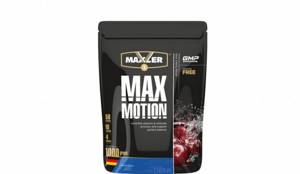
1 Maxler
The Maxler company opens the top isotonic drinks with the Max Motion product line. They produce isotonic supplements in the form of powder and tablets. They contain vitamins B, C, E, magnesium, potassium, calcium, sodium, pantothenic and folic acid, biotin, niacin, and carbohydrates. To prepare an isotonic drink, the powder from the package must be mixed with water in a ratio of 20 g (about 2 tablespoons) per 450 ml. In this case, one serving will contain 71.4 kcal. To make the drink more enjoyable, the powders are produced in various flavors: apricot-mango, cherry and lemon-grapefruit. Packages contain 500 or 1000 g of substance.
The second type of isotonic is Max Motion With L-Carnitine. In addition to the standard isotonic composition, L-carnitine was added to it. This element also helps replenish strength and increase endurance, but its main effect is to improve the fat burning process and prevent the creation of new fat deposits. Max Motion With L-Carnitine is also sold in powder form in packs of 500 and 1000 g. In addition to the flavors listed above, pineapple is also available.
And the last product from the isotonic line is Max Motion in effervescent tablets. They are a little easier to take than the powder, but the tablets also need to be dissolved in water rather than just washed down with liquid. It is recommended to use 2 tablets per 500 ml of water; one package contains 20. Available flavors: apricot and pomegranate.
Any of the listed products is suitable for both gaining weight and cutting, but the best drug for weight loss is Max Motion With L-Carnitine.
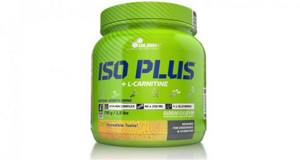
2 Olimp
In second place in the ranking of the best isotonics is the European company Olimp with its Hydratonic and ISO Plus Powder products. The first preparation is packages of powder (700 and 1505 g each), and the second is packages of bagged, dosed powder: 22 pieces of 20 g each.
Olimp Hydratonic is a standard isotonic drink containing glucose, carbohydrates, vitamins, minerals and other micro- and macroelements. One 20-gram sachet is enough for 250 ml of liquid, which you need to drink during 20-30 minutes of intense training. Available flavors: orange and lemon.
The second product, ISO Plus Powder, is supplemented with substances such as L-glutamine and L-carnitine. They help maintain endurance longer, burn fat deposits to release energy and protect muscles from acidification. The manufacturer recommends adding 1.5 scoops (about 17.5 g) to 250 ml of water and consuming the drink before, during and after training. Available flavors: tropic, orange, lemon.
